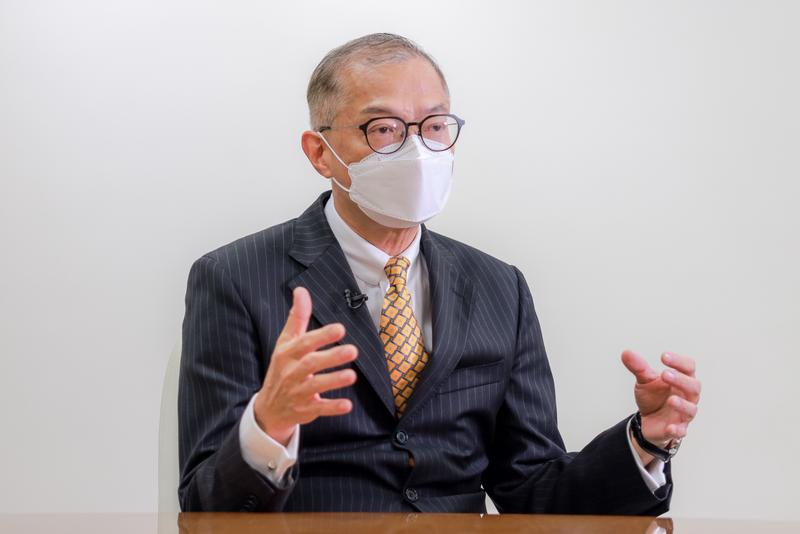A liver transplant expert is using his experience at HKU-SZ Hospital not only to improve Hong Kong’s healthcare services as city’s health chief, but also to deepen medical collaboration in the Greater Bay Area. Oasis Hu reports from Hong Kong.
 Lo Chung-mau, Hong Kong’s secretary for health, talks to China Daily during an interview. (ANDY CHONG / CHINA DAILY)
Lo Chung-mau, Hong Kong’s secretary for health, talks to China Daily during an interview. (ANDY CHONG / CHINA DAILY)
Editor’s note: In this series, China Daily interviews the new heads of bureaus and other departments of the Hong Kong Special Administrative Region. The heads discuss project plans, prospects, and ways to address the city’s current issues and challenges from their perspectives.
To top-notch liver doctor Lo Chung-mau, the decision to switch from helping individual patients to taking responsibility for more than 7 million residents in Hong Kong was not a difficult one to make, as both tasks ultimately revolve around helping other people.
As the former chief executive of the University of Hong Kong-Shenzhen Hospital from 2016 to 2022, Lo is one of the few principal officials of the special administrative region government to have experienced a relatively long stay in Hong Kong’s neighboring city, Shenzhen, before taking up his current role as the secretary for health.
His six-year stay in the nation’s innovation powerhouse has, in Lo’s eyes, better equipped him to carry out his responsibilities as the top leader of the SAR Health Bureau.
Speaking to China Daily in an exclusive interview, Lo said that experience is essential and meaningful for him, as it enables him to better fulfill his role as the secretary for health, with duties included in this position being to improve cross-border healthcare and continue collaborating with the Chinese mainland.
When the COVID-19 pandemic broke out in February 2020, Lo, taking helm of the cross-border hospital, packed his bags, drove himself from Hong Kong to Shenzhen, and settled down. Before the crisis, he had been commuting between the two places.
Back then, he had two things in mind: one was to race to help the country in its full-blown war against the deadly virus; the other was to take responsibility for improving healthcare collaboration between Shenzhen and Hong Kong.
Lo hadn’t expected to find himself so much in awe of the Shenzhen “miracle”, which had unfolded so rapidly over the previous 40 years, as he settled in for his almost three-year stay there — a period which would have been longer had he not decided to take up his role as the SAR’s secretary for health.
If Lo’s experience is anything to go by, Shenzhen’s lifestyle, infrastructure, cuisine, beautiful environment — and especially its people — are all tremendous pull factors, which Hong Kong’s youth should experience in person.
Lo is considering organizing more events for Hong Kong youngsters to see and learn from in Shenzhen once the pandemic situation has improved, a practice borrowed from the summer camps held by the HKU-SZ hospital to accommodate the city’s students, so they can see the miracle in person.
More services will be offered to address the medical needs of Hong Kong residents living in mainland cities of the Guangdong-Hong Kong-Macao Greater Bay Area, in a bid to foster a better, high-quality lifestyle for them, Lo revealed.
For example, the program to enable eligible elderly folk from Hong Kong who are living in the Greater Bay Area to use healthcare vouchers to pay for outpatient service fees from the HKU-SZ Hospital will be extended to more clinics in various cities of the area. The vouchers may also be used in the future to settle payments of the mainland’s medical insurance premiums.
In addition, Lo will assess new hospitals, especially hospitals organized and managed by Hong Kong parties located in the region, to provide medical services similar to those of Hong Kong for SAR residents living on the mainland.
Lo’s stay in Shenzhen began at the start of the pandemic, while he is now the spokesperson for Hong Kong’s pandemic control, and may eventually be among the decision-makers to call an end to the cross-border travel restrictions implemented because of COVID-19.
“In managing HKU-SZ Hospital, I realized that I can help more people and improve their lives by building a unique platform for the Hong Kong healthcare system to collaborate with the mainland,” Lo said.
To Lo, with great power comes great responsibility, but an even greater sense of achievement and self-fulfillment.
“As a surgeon, I try to find innovative transfer operations to save more lives,” Lo said.
“Now I am affecting the health and the lives of more than 7 million people in Hong Kong. The responsibility gets more, but at the same time, the (sense of) achievement is also more. In this new position, I do hope I will be able to make people in Hong Kong healthy,” Lo said.
His experience in Shenzhen has also increased his confidence in “Made in China”, Lo said. He received his COVID-19 vaccines in Shenzhen, and all four doses were made domestically. His work in the HKU-SZ Hospital demonstrated to him that the quality of Chinese drugs and medical devices is “super” and “there is no reason to question that”, Lo said.
As a top-notch liver expert, Lo has devoted himself to clinical work and scientific research in hepatobiliary surgery for over three decades. He has published over 600 original articles in refereed international journals. His H-index, an author-level metric measuring both the productivity and citation impact of publications, is 94, a number considered extremely high by the scientific community, and which firmly places Hong Kong on the world map for liver transplants.
Under his leadership, HKU-SZ Hospital became a pioneer in medical integration in the Greater Bay Area, and was selected as a National High-Quality Development Hospital in 2021.
Contact the writer at oasishu@chinadailyhk.com


